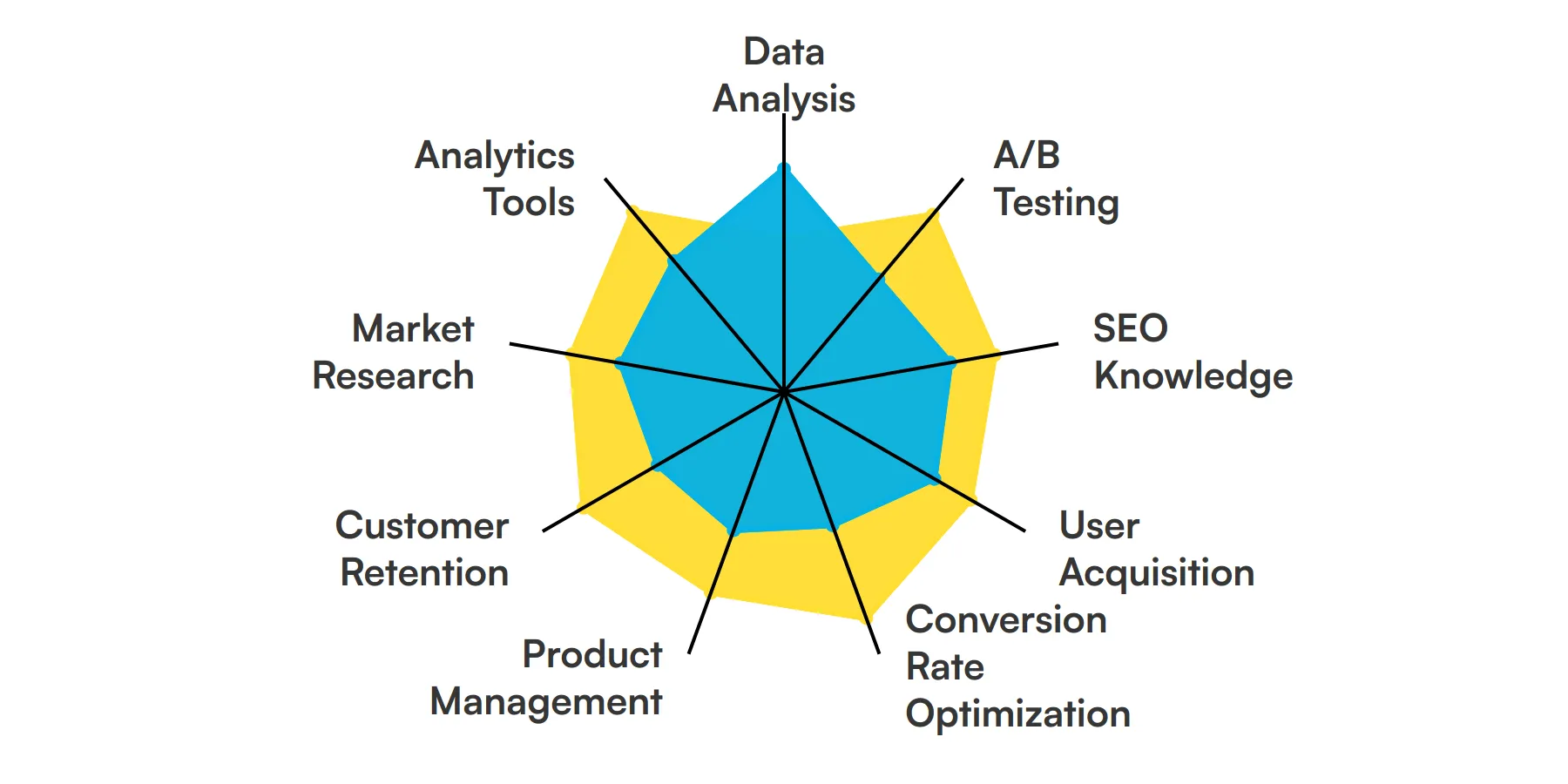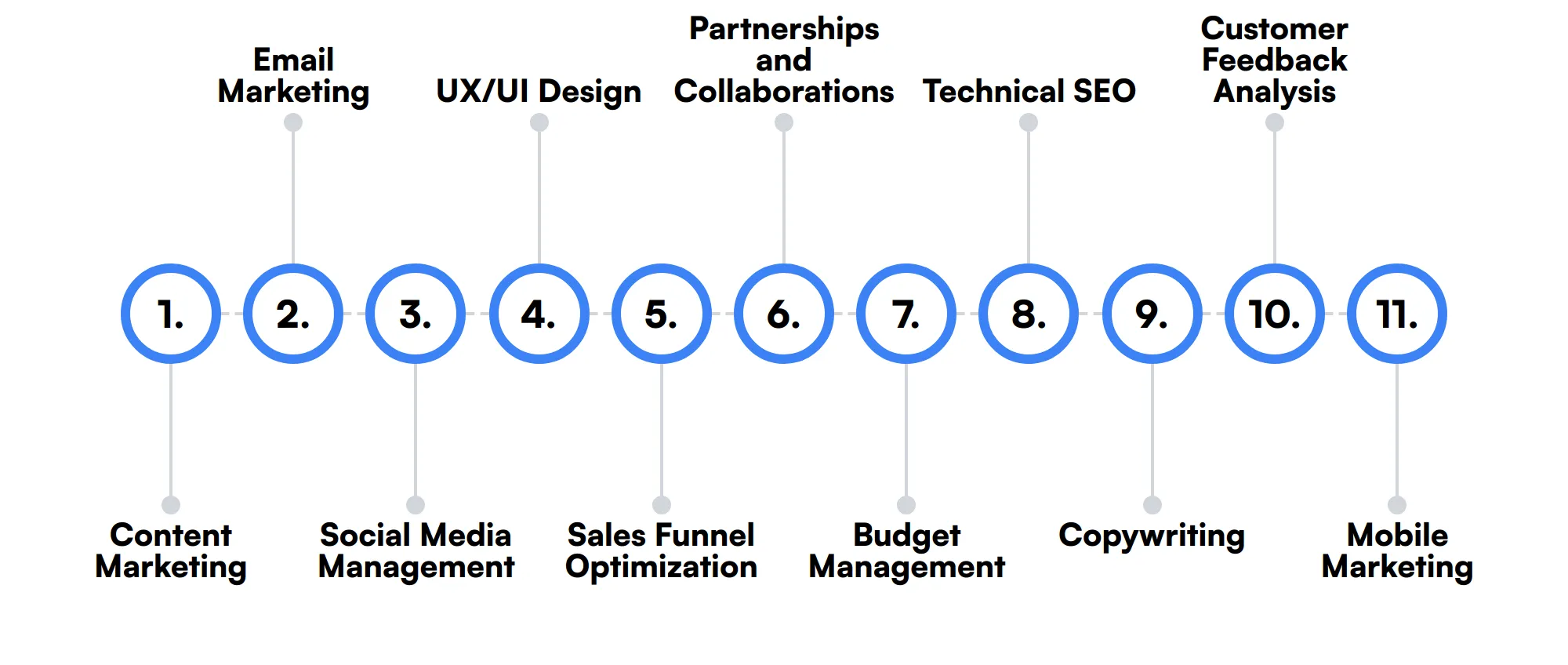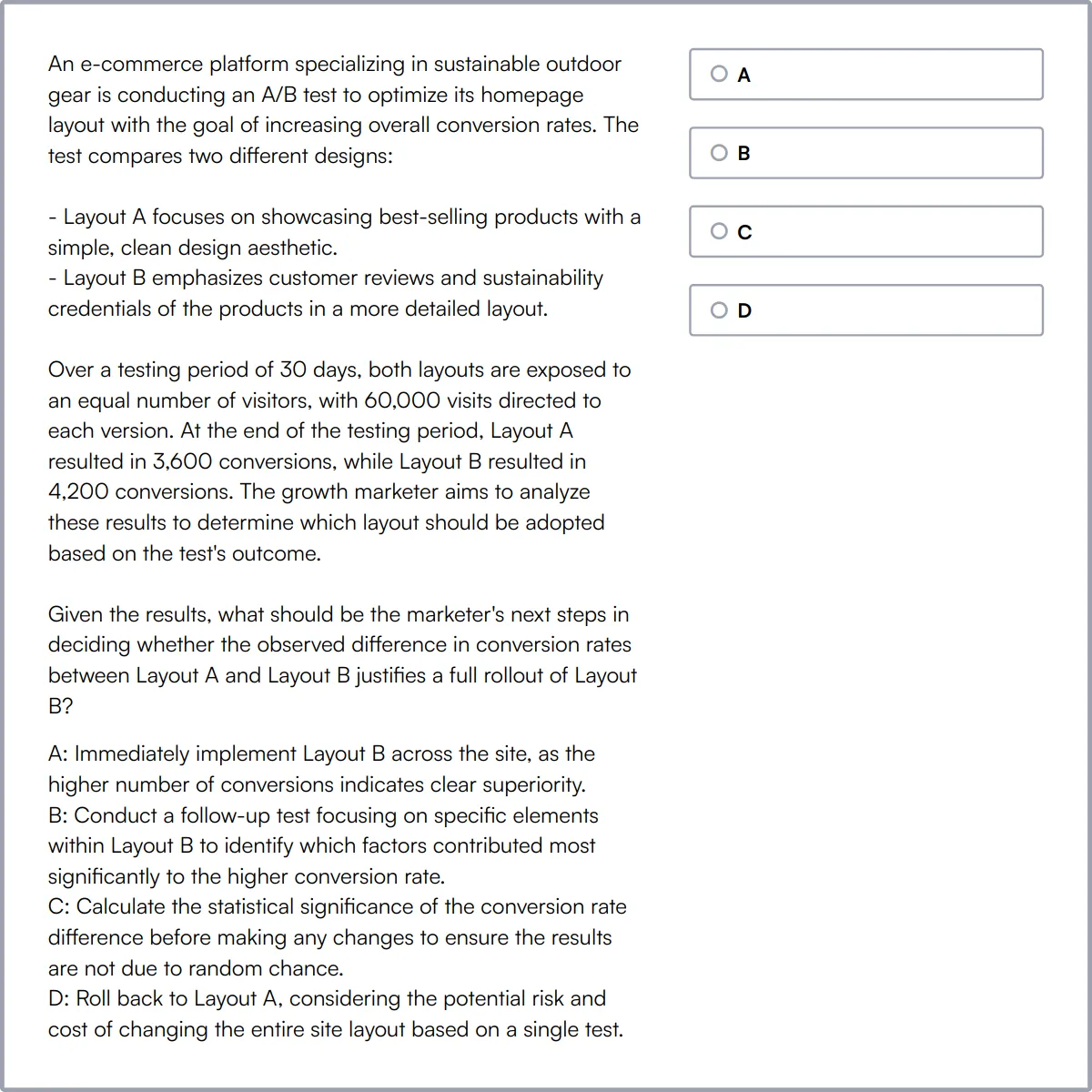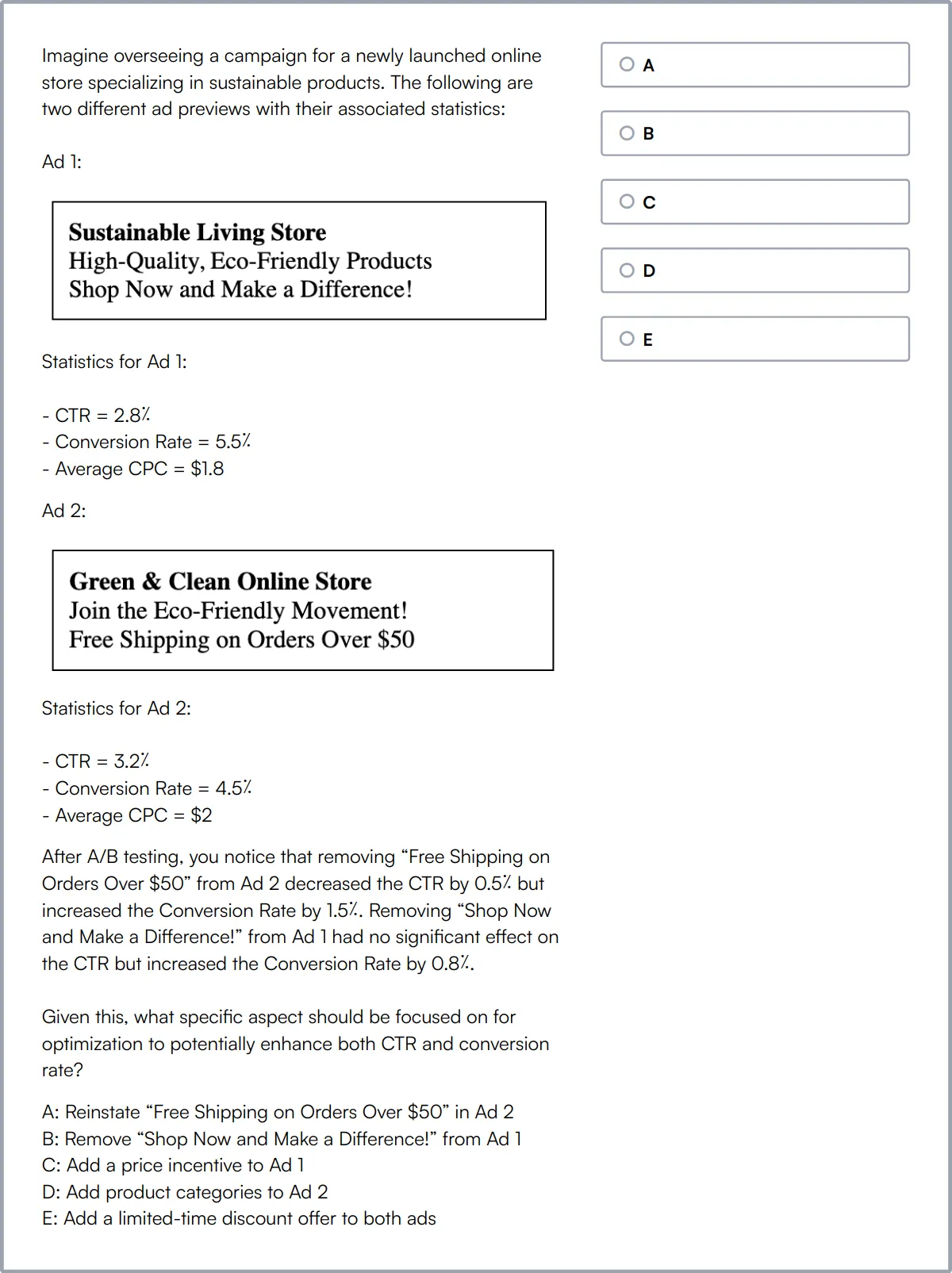The Head of Growth is responsible for driving a company's growth strategy and ensuring sustainable business expansion. This role involves identifying new opportunities, optimizing existing channels, and leveraging data to make informed decisions that fuel growth.
Skills required for a Head of Growth include a strong understanding of marketing, data analysis, and product management. Additionally, they must possess leadership abilities and a knack for strategic thinking to effectively guide their team and achieve growth targets.
Candidates can write these abilities in their resumes, but you can’t verify them without on-the-job Head of Growth skill tests.
In this post, we will explore 9 essential Head of Growth skills, 11 secondary skills and how to assess them so you can make informed hiring decisions.
Table of contents
9 fundamental Head of Growth skills and traits
The best skills for Head of Growths include Data Analysis, A/B Testing, SEO Knowledge, User Acquisition, Conversion Rate Optimization, Product Management, Customer Retention, Market Research and Analytics Tools.
Let’s dive into the details by examining the 9 essential skills of a Head of Growth.

Data Analysis
Data analysis is the backbone of growth strategies. The Head of Growth needs to interpret complex data sets to identify trends, measure performance, and make informed decisions. This skill helps in understanding what drives user engagement and conversion rates.
For more insights, check out our guide to writing a Data Analyst Job Description.
A/B Testing
A/B testing allows the Head of Growth to experiment with different variables to see what works best. By comparing two versions of a webpage or app feature, they can determine which one performs better, leading to more effective growth strategies.
SEO Knowledge
Search Engine Optimization (SEO) is crucial for driving organic traffic. The Head of Growth must understand how to optimize content and website structure to rank higher on search engines, thereby increasing visibility and attracting more users.
Check out our guide for a comprehensive list of interview questions.
User Acquisition
User acquisition involves strategies to attract new users to the product or service. The Head of Growth needs to be adept at various acquisition channels like social media, email marketing, and paid advertising to grow the user base.
Conversion Rate Optimization
Conversion Rate Optimization (CRO) focuses on increasing the percentage of visitors who take a desired action. The Head of Growth uses this skill to improve user experience and design elements that lead to higher conversion rates.
Product Management
Product management skills are essential for understanding the lifecycle of a product. The Head of Growth needs to collaborate with product teams to ensure that growth strategies align with product development and user needs.
For more insights, check out our guide to writing a Product Manager Job Description.
Customer Retention
Customer retention strategies are vital for maintaining a loyal user base. The Head of Growth must implement tactics to keep users engaged and satisfied, reducing churn and increasing lifetime value.
Market Research
Market research helps in understanding the competitive landscape and user needs. The Head of Growth uses this skill to identify opportunities for growth and to tailor strategies that meet market demands.
Analytics Tools
Proficiency in analytics tools like Google Analytics, Mixpanel, or Amplitude is crucial. The Head of Growth uses these tools to track performance metrics, user behavior, and campaign effectiveness.
11 secondary Head of Growth skills and traits
The best skills for Head of Growths include Content Marketing, Email Marketing, Social Media Management, UX/UI Design, Sales Funnel Optimization, Partnerships and Collaborations, Budget Management, Technical SEO, Copywriting, Customer Feedback Analysis and Mobile Marketing.
Let’s dive into the details by examining the 11 secondary skills of a Head of Growth.

Content Marketing
Content marketing involves creating valuable content to attract and engage users. While not the primary focus, the Head of Growth should understand how content can drive traffic and conversions.
Email Marketing
Email marketing is a powerful tool for nurturing leads and retaining customers. The Head of Growth should know how to craft effective email campaigns that drive engagement and conversions.
Social Media Management
Managing social media channels can help in building brand awareness and engaging with users. The Head of Growth should be familiar with social media strategies that can drive growth.
UX/UI Design
A basic understanding of UX/UI design can be beneficial. The Head of Growth should know how design impacts user experience and conversion rates, even if they are not directly involved in design tasks.
Sales Funnel Optimization
Optimizing the sales funnel involves improving each stage of the user journey. The Head of Growth should understand how to streamline the funnel to reduce drop-offs and increase conversions.
Partnerships and Collaborations
Building partnerships can open new growth avenues. The Head of Growth should be able to identify and negotiate collaborations that can drive user acquisition and brand visibility.
Budget Management
Managing budgets effectively ensures that resources are allocated to the most impactful growth strategies. The Head of Growth should be adept at financial planning and analysis.
Technical SEO
Technical SEO involves optimizing the backend of a website. The Head of Growth should have a basic understanding of technical SEO to ensure the site is search-engine friendly.
Copywriting
Effective copywriting can significantly impact user engagement and conversion rates. The Head of Growth should know how to craft compelling messages that resonate with the target audience.
Customer Feedback Analysis
Analyzing customer feedback helps in understanding user needs and pain points. The Head of Growth should be able to gather and interpret feedback to inform growth strategies.
Mobile Marketing
With the increasing use of mobile devices, mobile marketing strategies are essential. The Head of Growth should be familiar with tactics to engage mobile users effectively.
How to assess Head of Growth skills and traits
Assessing the skills and traits of a Head of Growth can be a challenging task, given the diverse range of expertise required for the role. From data analysis and A/B testing to SEO knowledge and user acquisition, a Head of Growth must wear many hats to drive a company's growth effectively.
Traditional resumes and interviews often fall short in evaluating these multifaceted skills. This is where skills-based assessments come into play. By leveraging tools like Adaface assessments, you can gain a clearer picture of a candidate's competencies, leading to a 2x improved quality of hires.
Whether it's conversion rate optimization, product management, or customer retention, each skill can be meticulously evaluated through tailored assessments. This approach not only ensures that you find the right fit for your team but also results in an 85% reduction in screening time, making the hiring process more efficient and effective.
Let’s look at how to assess Head of Growth skills with these 6 talent assessments.
Data Analysis Test
Our Data Analysis Test assesses a candidate's ability to handle, modify, analyze, and interpret data. This test is designed to screen for experience with analyzing data to find possible outcomes, detect anomalies, extract meaningful insights, project estimates, and visualize data using charts and graphs.
The test evaluates skills in data modeling, business analysis fundamentals, data interpretation, and SQL. Candidates will navigate through scenario-based MCQs that cover data analysis, business analysis, data interpretation, and SQL queries.
Successful candidates demonstrate proficiency in using popular data tools like Excel, performing data operations such as predictions and anomaly detection, and conducting data investigations involving correlations and ranking.

A/B Testing Test
The A/B Testing Test assesses a candidate's knowledge of A/B testing methodologies and their ability to analyze and interpret data to make data-driven decisions. It evaluates their understanding of statistical concepts, experimental design, hypothesis testing, and data analysis techniques.
This test covers designing A/B tests, data analysis, and A/B testing integrations. Candidates will answer MCQs that test their ability to design experiments, analyze results, and integrate A/B testing into web applications.
High-scoring candidates show a strong grasp of A/B testing conversions and the ability to apply statistical concepts to real-world scenarios.
PPC Assessment Test
The PPC Advertising Test uses scenario-based multiple choice questions to evaluate candidates on their understanding of pay-per-click advertising concepts and strategies. This includes keyword research, ad copywriting, bid management, landing page optimization, conversion tracking, and campaign performance analysis.
The test assesses skills in PPC advertising, digital marketing, campaign optimization, and budget management. Candidates will navigate through questions that test their ability to manage PPC campaigns effectively.
Successful candidates demonstrate proficiency in using analytics and reporting tools to track and optimize campaign performance.
Growth Marketing Test
The Growth Marketing Test evaluates candidates' knowledge and skills in various areas of digital marketing. This includes Growth Marketing, SEO, Google Ads, PPC Advertising, Content Strategy, Copywriting, and Marketing Aptitude.
The test covers growth marketing, SEO, Google Ads, and content strategy. Candidates will answer MCQs that assess their ability to strategize and implement effective marketing campaigns for business growth.
High-scoring candidates show proficiency in marketing analysis and the ability to use Google Analytics to track and optimize marketing efforts.

SEO Online Test
The SEO assessment test evaluates a candidate's ability to perform site audits, develop a content strategy, and execute link building strategies. The scenario-based MCQ questions assess their ability to use tools like Google Search Console to track SEO metrics, perform keyword research, and understand On-page and Off-page SEO.
The test covers keyword research, link building techniques, content strategy, and page speed optimization. Candidates will navigate through questions that test their ability to optimize websites for search engines.
Successful candidates demonstrate proficiency in using premium SEO tools like Ahrefs, Moz, and Google Analytics to track and improve SEO performance.

AI Product Manager Test
The AI Product Manager Test is designed to assess a candidate's knowledge and skills in managing AI-driven products. It evaluates understanding of AI concepts, product strategy, customer insights, project management, and data analysis.
The test covers AI fundamentals, generative AI applications, data modeling, and project management. Candidates will answer MCQs that assess their ability to manage AI projects and communicate effectively with stakeholders.
High-scoring candidates demonstrate strong storytelling skills and the ability to translate complex AI concepts into actionable business strategies.
Summary: The 9 key Head of Growth skills and how to test for them
| Head of Growth skill | How to assess them |
|---|---|
| 1. Data Analysis | Evaluate ability to interpret and derive insights from data sets. |
| 2. A/B Testing | Assess proficiency in designing and analyzing controlled experiments. |
| 3. SEO Knowledge | Check understanding of search engine algorithms and optimization techniques. |
| 4. User Acquisition | Measure strategies for attracting and onboarding new users. |
| 5. Conversion Rate Optimization | Gauge skills in improving the percentage of visitors who convert. |
| 6. Product Management | Evaluate capability to oversee product lifecycle and development. |
| 7. Customer Retention | Assess methods for maintaining and increasing customer loyalty. |
| 8. Market Research | Check ability to gather and analyze market and competitor data. |
| 9. Analytics Tools | Evaluate proficiency in using tools like Google Analytics and Mixpanel. |
Growth Marketing Test
Head of Growth skills FAQs
What is the importance of data analysis in a Head of Growth role?
Data analysis helps identify growth opportunities, track performance metrics, and make data-driven decisions. It is essential for understanding user behavior and optimizing strategies.
How can A/B testing improve user acquisition?
A/B testing allows you to compare different versions of a campaign or feature to see which performs better. This helps in optimizing user acquisition strategies by identifying what resonates most with your audience.
Why is SEO knowledge important for a Head of Growth?
SEO knowledge helps in driving organic traffic to your website. Understanding SEO can improve search engine rankings, increase visibility, and attract more potential customers.
What role does conversion rate optimization play in growth?
Conversion rate optimization focuses on increasing the percentage of visitors who take a desired action. This can lead to higher revenue and better user engagement.
How can market research benefit a Head of Growth?
Market research provides insights into customer needs, market trends, and competitive landscape. This information is crucial for developing effective growth strategies.
What are the key analytics tools a Head of Growth should be familiar with?
Key analytics tools include Google Analytics, Mixpanel, and Amplitude. These tools help track user behavior, measure performance, and analyze data to inform growth strategies.
How does content marketing contribute to growth?
Content marketing attracts and engages potential customers through valuable content. It helps build brand authority, drive traffic, and convert leads into customers.
What is the significance of customer feedback analysis?
Customer feedback analysis helps understand user satisfaction and pain points. This information is vital for improving products, services, and overall customer experience.
Assess and hire the best Head of Growths with Adaface
Assessing and finding the best Head of Growth is quick and easy when you use talent assessments. You can check out our product tour, sign up for our free plan to see talent assessments in action or view the demo here:

40 min skill tests.
No trick questions.
Accurate shortlisting.
We make it easy for you to find the best candidates in your pipeline with a 40 min skills test.
Try for freeRelated posts
Free resources



